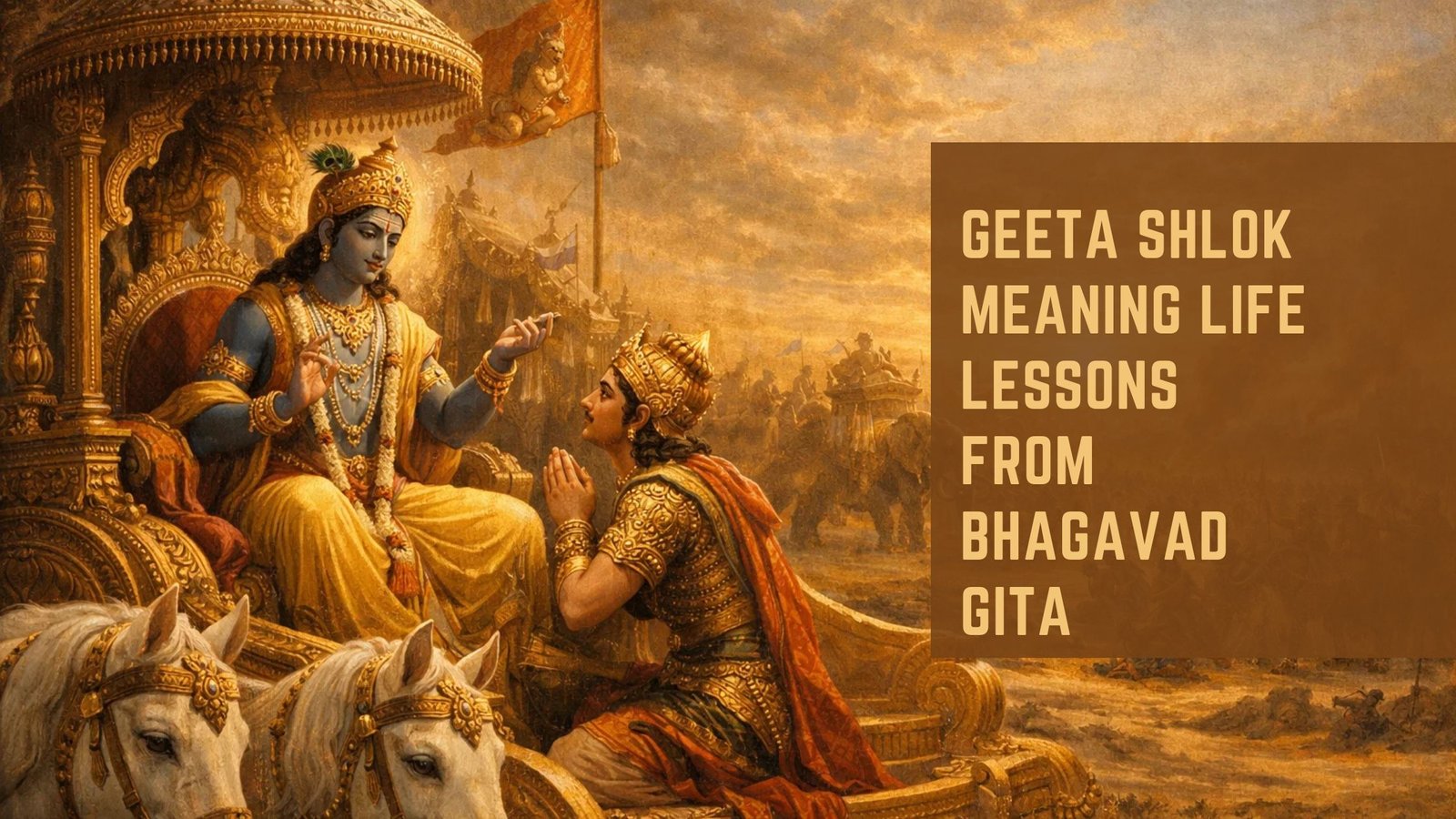The Bhagavad Gita, often referred to simply as the Gita, is a 700-verse Hindu scripture that is part of the Indian epic Mahabharata. It is a dialogue between Prince Arjuna and Lord Krishna, who serves as his charioteer. This sacred text is not merely a religious scripture; it is a philosophical treatise that addresses the moral and ethical dilemmas faced by individuals in their lives.
The Gita delves into profound themes such as duty, righteousness, and the nature of reality, making it a timeless guide for those seeking wisdom and understanding in a complex world. The context of the Gita is set on the battlefield of Kurukshetra, where Arjuna is torn between his duty as a warrior and his moral qualms about fighting against his own kin. This internal conflict serves as a catalyst for Krishna to impart spiritual wisdom, addressing the nature of life, death, and the importance of fulfilling one’s dharma, or duty.
The teachings of the Gita transcend cultural and temporal boundaries, offering insights that resonate with individuals from various walks of life. As such, it has become a cornerstone of Indian philosophy and spirituality, influencing countless thinkers and practitioners around the globe.
Key Takeaways
- The Bhagavad Gita is a sacred Hindu scripture that offers guidance on how to live a fulfilling and purposeful life.
- The concept of action in the Bhagavad Gita emphasizes the importance of performing one’s duty without attachment to the results.
- Our actions play a crucial role in shaping our destiny, as they have the power to create positive or negative consequences.
- Through selfless and righteous actions, individuals can achieve spiritual growth and ultimately attain liberation from the cycle of birth and death.
- Embracing our responsibilities and overcoming the fear of action is essential for personal and spiritual development, as it leads to inner peace and fulfillment.
Understanding the concept of action in the Bhagavad Gita
In the Bhagavad Gita, action is not merely a physical endeavor; it encompasses a broader spectrum of human experience, including thoughts, intentions, and decisions. Krishna emphasizes that every individual is bound to act according to their nature and circumstances. However, the essence of action lies in its alignment with one’s dharma.
The Gita teaches that one must engage in action without attachment to the results, a principle known as Nishkama Karma. This approach encourages individuals to focus on their responsibilities while relinquishing the desire for specific outcomes. Krishna’s teachings highlight that inaction is not an option; even the act of choosing not to act is, in itself, a form of action.
This paradox underscores the inevitability of action in human life. The Gita encourages individuals to embrace their roles and responsibilities with a sense of purpose and commitment. By understanding that action is an integral part of existence, individuals can navigate their lives with greater clarity and intention, ultimately leading to personal growth and fulfillment.
The significance of action in shaping our destiny

The Bhagavad Gita posits that actions are instrumental in shaping one’s destiny. Each choice made and every action taken contributes to the karmic cycle that influences future experiences. Krishna elucidates that while individuals may not have control over the fruits of their actions, they do possess the power to choose how they respond to life’s challenges.
This understanding empowers individuals to take ownership of their lives and decisions, recognizing that their actions have far-reaching consequences. Moreover, the Gita emphasizes that one’s current circumstances are often a result of past actions. This concept of karma serves as a reminder that individuals are not merely passive recipients of fate; rather, they are active participants in crafting their destinies through conscious choices.
By engaging in righteous actions aligned with their dharma, individuals can cultivate positive karma that paves the way for a more fulfilling future. Thus, the teachings of the Gita inspire individuals to act with intention and integrity, knowing that their actions hold the key to shaping their lives. For more information on the concept of karma and destiny in the Bhagavad Gita, you can visit the Holy Bhagavad Gita website.
The role of action in achieving spiritual growth
| Actions | Impact on Spiritual Growth |
|---|---|
| Prayer | Brings a sense of connection and peace |
| Meditation | Helps in self-reflection and inner peace |
| Service to others | Fosters empathy and compassion |
| Self-discipline | Strengthens willpower and focus |
| Study of spiritual texts | Deepens understanding and wisdom |
In the pursuit of spiritual growth, action plays a pivotal role in the Bhagavad Gita. Krishna teaches that spiritual evolution is not solely achieved through meditation or renunciation; rather, it is through selfless action that individuals can attain higher states of consciousness. Engaging in service to others and fulfilling one’s duties with devotion fosters a sense of connection to the divine and cultivates inner peace.
The Gita encourages individuals to see their work as an offering to God, transforming mundane tasks into acts of worship. Furthermore, the practice of selfless action helps individuals transcend their ego and personal desires. By focusing on the well-being of others and acting without attachment to outcomes, individuals can experience a profound sense of liberation from the burdens of material existence.
This shift in perspective allows for spiritual awakening and deeper understanding of one’s true nature. The Gita teaches that through dedicated action rooted in love and compassion, individuals can elevate their consciousness and move closer to realizing their divine potential.
Overcoming the fear of action and embracing our responsibilities
Fear often paralyzes individuals from taking necessary actions in their lives. The Bhagavad Gita addresses this fear by emphasizing the importance of courage and commitment to one’s duties. Krishna reassures Arjuna that it is natural to feel apprehensive about facing challenges; however, succumbing to fear can lead to stagnation and missed opportunities for growth.
The Gita encourages individuals to confront their fears head-on and embrace their responsibilities with determination. By recognizing that fear is an inherent part of the human experience, individuals can cultivate resilience and strength. The teachings of the Gita inspire individuals to act despite their fears, understanding that true growth often lies outside one’s comfort zone.
Embracing responsibilities not only fosters personal development but also contributes to the greater good. In this way, the Gita serves as a powerful reminder that overcoming fear is essential for fulfilling one’s potential and making meaningful contributions to society.
The importance of performing selfless actions

Selfless action is a central theme in the Bhagavad Gita, where Krishna advocates for performing duties without attachment to personal gain. This principle encourages individuals to act out of love and compassion rather than self-interest. By engaging in selfless actions, individuals can cultivate a sense of unity with others and foster harmonious relationships within their communities.
The Gita teaches that when actions are performed with pure intentions, they become a source of joy and fulfillment. Moreover, selfless actions contribute to spiritual growth by dissolving the ego and fostering humility.
This realization leads to greater empathy and compassion, qualities that are essential for spiritual evolution. The teachings of the Gita remind individuals that selfless service is not only beneficial for others but also serves as a pathway to inner peace and enlightenment.
Finding balance between action and detachment
The Bhagavad Gita emphasizes the importance of finding balance between action and detachment. While engaging in duties is essential for personal growth and fulfillment, it is equally important to cultivate a sense of detachment from the fruits of those actions. Krishna teaches that attachment can lead to suffering and disappointment when outcomes do not align with expectations.
By practicing detachment, individuals can approach their responsibilities with equanimity and grace. This balance allows individuals to remain focused on their duties while maintaining an inner sense of peace regardless of external circumstances. The Gita encourages individuals to view success and failure as two sides of the same coin, both integral parts of life’s journey.
By cultivating this perspective, individuals can navigate challenges with resilience and maintain clarity in their decision-making processes. Ultimately, finding harmony between action and detachment enables individuals to live authentically while remaining grounded in their spiritual principles.
Applying the teachings of the Bhagavad Gita in our daily lives
The teachings of the Bhagavad Gita offer profound insights that can be applied in everyday life. By embracing the principles outlined in this sacred text—such as selfless action, courage in facing responsibilities, and finding balance between action and detachment—individuals can navigate life’s complexities with greater wisdom and purpose. The Gita serves as a timeless guide for those seeking clarity amidst uncertainty, encouraging them to act with integrity while remaining connected to their higher selves.
Incorporating these teachings into daily life requires conscious effort and reflection. Individuals can begin by assessing their motivations behind actions and striving for selflessness in their endeavors. By cultivating awareness around their choices and embracing responsibilities with courage, they can foster personal growth while contributing positively to society.
Ultimately, applying the teachings of the Bhagavad Gita empowers individuals to lead lives filled with meaning, compassion, and spiritual fulfillment—a legacy that resonates far beyond their immediate circumstances.
In Bhagavad Gita chapter 4 verse 18, Lord Krishna explains to Arjuna about the importance of performing actions without attachment to the results. This concept is further explored in an article titled “Divine Conversations: God Talks with Arjuna in the Bhagavad Gita” available at thegita.in. The article delves into the profound teachings of the Gita and how they can be applied to our daily lives. For more insights on the nature of man and the wisdom of the Bhagavad Gita, visit thegita.in.
FAQs
What is the significance of Bhagavad Gita chapter 4 verse 18?
Bhagavad Gita chapter 4 verse 18 emphasizes the concept of action without attachment to the results. It teaches that one should perform their duties without being attached to the outcomes, and instead focus on the action itself.
What does Bhagavad Gita chapter 4 verse 18 teach?
Bhagavad Gita chapter 4 verse 18 teaches the importance of performing one’s duties without being attached to the results. It emphasizes the idea of selfless action and detachment from the fruits of one’s labor.
How does Bhagavad Gita chapter 4 verse 18 relate to daily life?
Bhagavad Gita chapter 4 verse 18 is relevant to daily life as it encourages individuals to focus on their actions and responsibilities without being overly concerned about the outcomes. It promotes a mindset of selfless service and detachment from the results of one’s efforts.
What are the key teachings of Bhagavad Gita chapter 4 verse 18?
The key teachings of Bhagavad Gita chapter 4 verse 18 include the importance of performing one’s duties without attachment to the results, the concept of selfless action, and the idea of detachment from the fruits of one’s labor.














